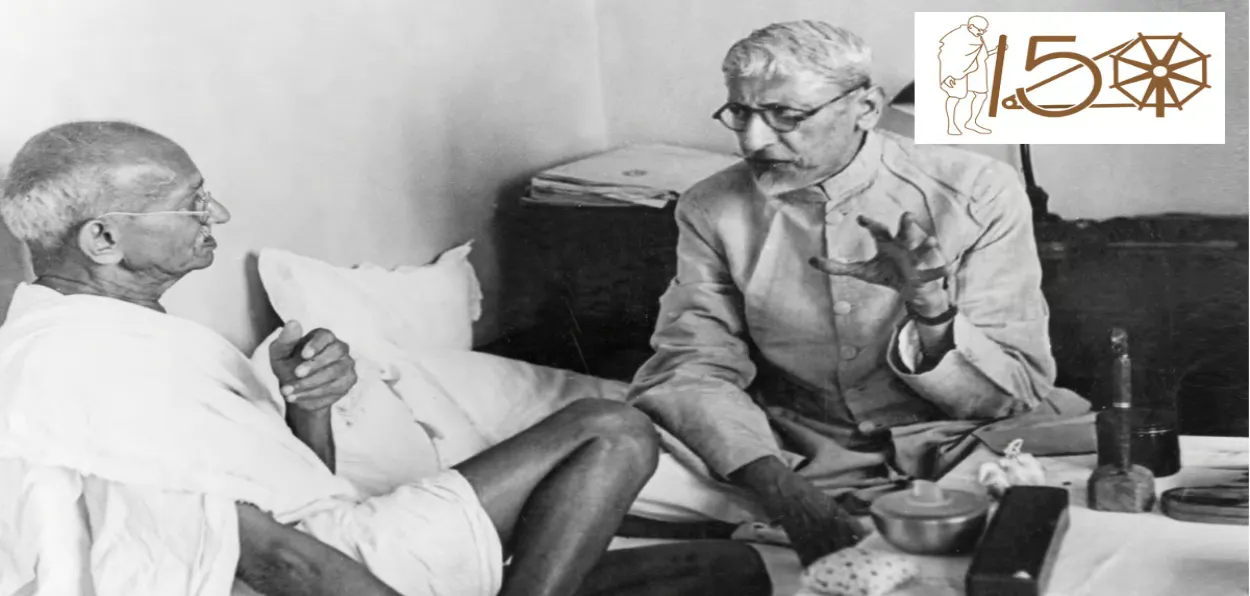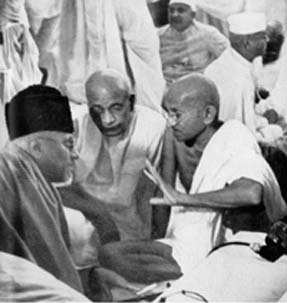
Saquib Salim
“Maulana Abul Kalam Azad had distinguished himself as a rebel even before Gandhiji. In 1916, when the World War was going on, Gandhiji was a co-operator and proclaimed and preached loyalty to British rule. But the Maulana had even then proclaimed himself a rebel and was interned by the Government of India. It is a fact of signal significance that at the helm of the Congress which has refused Britain her co-operation in the war in which she is engaged, unless she sheds her Imperialism and recognizes the Independence of India, is the same eminent Muslim leader who offered battle to the British Government during the last World War.”
This is what Mahatma Gandhi’s secretary Mahadev Desai wrote while addressing the impression that Maulana Azad was a token President of Congress in 1940 appointed to wean Muslims away from the Muslim League.
Desai points out that Maulana Azad was the only leader of prominence who opposed the British government during both the World Wars and was therefore he was more anti-British than anyone, including Gandhi.
Why was Desai speaking for Maulana Azad when Gandhi himself wrote, “I have had the privilege of being associated with Maulana Abul Kalam Azad in national work since 1920”?
During the First World War, the Congress leaders including Gandhi preached loyalty to the British war efforts while a few revolutionaries tried to wage war against the colonial rulers with the help of their enemies, viz. Germany and Turkey. The Silk Letter Conspiracy was one of the most ambitious plans to uproot British rule from India.
Islamic clerics (especially associated with the Deoband School), Arya Samjists, Ghadarites, Bengal revolutionaries, and other groups joined hands to create an 1857 armed uprising in India. Messages written on Silk cloth were confiscated from Afghanistan where a Provisional Government of Free India headed by Raja Mahendra Pratap had been formed. The revolutionaries had contacts with Turkey and Germany.
Maulana Azad with Jawaharlal Nehru and Mahatama Gandhi
The British Intelligence reported Maulana Azad as one of the most important ‘conspirators’ in this Movement known as the Silk Letter Conspiracy.
Desai pointed out Maulana Azad preceded Gandhi in his revolutionary outlook against British colonialism. This becomes evident from Al-Hilal (an Urdu Weekly), started by Maulana in 1912 when he was only 24 years old. The idea was to bring more and more Muslims into the revolutionary struggle against the British. The success of the paper was enormous and soon ensured actions by the British police and courts against it.
The impact could be gauged by the fact that within a few months, Al-Hilal had created a public opinion so strong that the Muslim League had to amend its constitution. The secretary of the League, Syed Wazir Hasan, initially opposed the ideas of Maulana only to change after a meeting with him. In April 1913, at its Lucknow Session, the Muslim League changed its constitution and introduced "the attainment of suitableSelf-Government for India" instead of "loyalty to British Government, and the attainment of the rights of the Mussalmans." The League for the first time came to have a nationalist political objective. It must also be noted here that Maulana did not want the word suitable, for him self-government had only one meaning, i.e. complete independence.
Not only the Muslim League, Al-Hilal impacted a few Europeans as well. John Philby, an English officer posted in Multan, was given a charge to prepare weekly reports on this paper for the government. He was so impressed that he went to Kolkata to meet the Maulana and under his influence learned Arabic. Later in life, he became famous for writing Heart of Arabia.
Maulana Azad’s pro-German position during the First World War was quite evident and was pointed out by the pro-British newspaper the Pioneer, "Al-Hilal is a weekly illustrated newspaper published in the Urdu language in Calcutta, and is edited by a Delhi Mussalman named Abul Kalam. It has a large circulation among Mussalmans in these provinces, and probably in other parts of India. Ever since the war broke out, its attitude has been so strikingly pro-German that it must be a matter of amazement to all who read the paper that the Government has managed to tolerate its writings…. Another reason may be that the style of the most mischievous articles is very allusive and full of veiled sneers sarcasm and innuendoes, most of which either disappear or lose their effect when translated into English, and it is not likely that many European officials read the paper in the original"
Soon, the paper was confiscated and Madras, United Provinces, and Punjab prohibited his entry. In April 1915, Bengal also expelled him from the province. The Maulana went to Ranchi (then in Bihar) and was interned there till 1920.
His crime was not limited to a newspaper. A CID report prepared against Azad, had reported that he established a Madarsa, Darul Irshad, on the lines of Manicktolla Gita School of Aurobindo Ghosh. The Madarsa was charged with spreading anti-British and nationalist feelings among the Muslim students. Manicktolla Gita School is credited for pioneering throwing bombs on British officials. At the same time, Azad organised an armed revolutionary group, Hizbullah. The group had more than 1700 members, who took the oath of sacrificing their lives.
 Mahatama Gandhi, Maulana Azad and Patel
Mahatama Gandhi, Maulana Azad and Patel
The Silk Letter Conspiracy mentioned above was also one of Maulana Azad’s initiatives. The Chief Secretary of Bihar wrote to the Secretary of the Government of India in 1918, “In July 1917 we wrote to Sir Charles (Cleveland) asking him whether there had been any fresh developments and whether it was intended to keep the Maulana interned much longer. Sir Charles replied on the 23rd of that month that Mr. Sands had submitted a full report on the Silk Letter Conspiracy Case and that had the case been put into court, Abul Kalam Azad would have been one of the chief accused, but that the case was not going to be put into court at that time, and further that the Government of India had under consideration a petition from the Maulana's friends praying for his trial or release.
"It was added that the Government of India would shortly communicate orders to the local Government and also that it was recognised that Abul Kalam Azad's case was one for which the Government of India was primarily responsible. Sir Charles went on to say that he did not think that there was any chance of this individual's internment coming to an end before the conclusion of the war or that the Governments of Bihar and Orissa would suggest such a course after seeing the Report on the Silk Letter Case in connection with which Abul Kalam Azad's internment was originally suggested by him with the approval of the Government of India.”
Assistant Director, Central Intelligence, Mr. Vivian reported in October 1916, “From a perusal of the papers in the 'Silk Letter Case' it seems clear that Abul Kalam Azad has been from the start one of the principal conspirators. He is listed in the "Army of God" as a "Lieutenant-Colonel" in company with such active workers as the transfrontier Mullahs and Muhammad Mian, himself; and though in the intercepted silk letter from the latter in Kabul to M. Mahmud Hasan in Medina, Abul Kalam Azad is said to have become "inactive" (owing presumably to his quasi-internment and the attentions of Government), the statements and other papers in the case show that he was a prominent encourager of the conspiracy and was himself preparing to join his friend Obeidullah in Kabul when the letters were discovered.”
It must be noted that Obaidullah being mentioned here is Obaidullah Sindhi, the Home Minister of the Raja Mahendra Pratap-led Provisional Government formed in Kabul. The report showed that the Maulana was one of the main leaders of this revolutionary plan and Barkatullah, Prime Minister of the Provisional Government, was also having correspondence with him.
Maulana Azad was considered a revolutionary instead of his later image of an ‘agitating politician’. The Chief Secretary to Bihar, in 1917, wrote to the Secretary of the Government of India, “The Maulana is said to be acquiring considerable influence in Ranchi where he poses amongst his co-religionists as a martyr unjustly interned on account of his religious and political views. The facts of his case are not fully known to the local Government but there is enough on record to show that he has not been interned merely on account of his participation in political agitation, and it would clear the situation if an announcement to that effect could be made…”
When he came out of internment at Ranchi in 1920, Maulana Azad adopted non-violent methods. He was one of the original three people who had chalked out plans for the Non-Cooperation Movement, Mahatma Gandhi and Hakim Ajmal Khan were the other two.
Why did he shift from revolutionary methods to non-violent politics? Maulana Azad answered this in front of a British colonial court. He emphatically declared, “Unlike Mahatma Gandhi, my belief is not that armed forces should never be opposed by armed forces. It is my belief that such opposing violence with violence is fully in harmony with the natural laws of God in those circumstances under which Islam permits the use of such violence. But at the same time, for purposes of the liberation of India and the present agitation, I entirely agree with all the arguments of Mahatma Gandhi and I have complete confidence in his honesty.”
ALSO READ: How Rassundari Devi became the first woman biographer of Bengal
Maulana Azad later led Congress during the Second World War and thus we can argue that among the prominent leaders of Congress active during those years of the Quit India Movement, he was the most experienced and seniormost. As Desai had pointed out, even Gandhi became rebellious after Maulana. Thus, it was fitting that it was under the Maulana that Congress launched the Quit India Movement.
